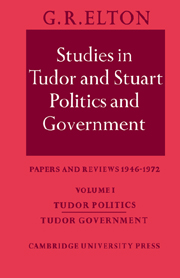Book contents
- Frontmatter
- Contents
- Preface
- Acknowledgments
- Abbreviations
- 1 The Terminal Date of Caesar's Gallic Proconsulate
- I TUDOR POLITICS
- II TUDOR GOVERNMENT
- 13 The Problems and Significance of Administrative History in the Tudor Period
- 14 The Rule of Law in Sixteenth-Century England
- 15 State Planning in Early-Tudor England
- 16 Henry VII's Council
- 17 Government by Edict?
- 18 Why the History of the Early Tudor Council Remains Unwritten
- 19 Henry VIII's Act of Proclamations
- 20 The Elizabethan Exchequer: War in the Receipt
- General Index
- Index of Authors Cited
18 - Why the History of the Early Tudor Council Remains Unwritten
Published online by Cambridge University Press: 03 February 2010
- Frontmatter
- Contents
- Preface
- Acknowledgments
- Abbreviations
- 1 The Terminal Date of Caesar's Gallic Proconsulate
- I TUDOR POLITICS
- II TUDOR GOVERNMENT
- 13 The Problems and Significance of Administrative History in the Tudor Period
- 14 The Rule of Law in Sixteenth-Century England
- 15 State Planning in Early-Tudor England
- 16 Henry VII's Council
- 17 Government by Edict?
- 18 Why the History of the Early Tudor Council Remains Unwritten
- 19 Henry VIII's Act of Proclamations
- 20 The Elizabethan Exchequer: War in the Receipt
- General Index
- Index of Authors Cited
Summary
In England, as in most parts of sixteenth-century Europe, the King's Council was the centre of administration, the instrument of policy making, the arena of political conflict, and the ultimate means for dispensing the king's justice. One would suppose that so essential, so inescapable, an institution would be well known; surely, it should have a book to itself. But this is not so. In 1922, A. F. Pollard noted that the history of the Tudor Council had been ignored by historians; and although this neglect has not continued unaltered, it is still true that the most important institution of Tudor England as yet lacks the sort of treatment which has been given to such bodies as the king's Chamber or the shortlived court of Augmentations. Of course, it has been written about. There are even books which claim to treat specifically of it, but for one reason or another they will hardly do. A. V. Dicey's The Privy Council(London, 1887) is a short and out-of-date sketch by a brilliant lawyer; that is to say, it has insight and understanding, but it does not even realize how many historical problems beset the question. Dorothy M. Gladish's The Tudor Privy Council(Retford, 1915) collects a good deal of material and says some useful things about the work of the Elizabethan Council, but it begs the whole question of institutional development by treating the Council of 1500 as though it were identical with that of 1600. Over E. R. Turner's The Privy Council of England in the 17th and 18th centuries, 1603–1784 (Baltimore, 1930–2), with its preliminary outline of Tudor developments, it will be only charitable to draw a veil.
- Type
- Chapter
- Information
- Studies in Tudor and Stuart Politics and GovernmentPapers and Reviews 1946–1972, pp. 308 - 338Publisher: Cambridge University PressPrint publication year: 1974
- 1
- Cited by



